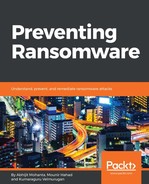We saw that the crypto currencies, MoneyPak and Ukash, were the medium for extorting money. There are ransomware that don't ask for any form of money. SurveyLocker is one ransomware that locks the victim's machine and asks him to go through a survey in order to unlock the computer.
Fortinet describes one such ransomware in their blog at https://blog.fortinet.com/2016/11/14/pc-locker-a-new-survey-locker-in-the-wild. The ransomware locks the desktop and asks the victim to complete a survey in order to get the password that unlocks the PC. The ransomware threatens to delete the data on the victim's computer if the victim fails to complete the survey within 72 hours.
Some other ransomware ask for Amazon Gift cards and iTunes in the form of the ransom.
As with every product where increasing revenue is a goal, it seems that ransomware needed to be tested in the wild. For an additional $50, Spora ransomware provided immunity from future attacks. And for $20 more, it offered the ability to remove the malware from your system. But it didn't seem that this business model was very successful since it didn't last for very long nor did it get copied much.
Some cyber crime gangs are more world-savvy than others. When running a worldwide ransomware campaign, it is not realistic to expect a victim in a poor country to pay the exorbitant amount that seems within the reach of a victim in a rich country. Some ransomware campaigns, such as the Fatboy ransomware, used the Economist's Big Mac Index to determine what should be the ransom amount for a particular victim, depending on its geographic location. For a quick background, the Big Mac Index is a measure of how much a Big Mac hamburger should cost in any part of the world based on the purchasing power of the local currency.
If you're still having issues making a payment, some ransomware campaigns have set up customer support portals with live chats to help you navigate the process.
Do people always pay? Certainly not. In some rare documented cases, criminals have shown mercy to victims with very valuable files who just could not pay even if they wanted to, and allowed them to decrypt their files for free. In most situations when people do not pay, a backup is available to recover from. In other situations, the data is just not valuable enough. And finally, some victims have no faith in the cyber criminals' ability to recover their files, so they just decide not the pay.
One thing is clear: cyber criminals are intent on getting your hard earned cash and they will go to great extents to help you pay the ransom.
